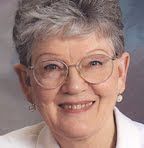RAPHAEL CLEMENT: MY FATHER IN-LAW
In June 1951, I graduated from BYU and immediately moved to Richland, Washington to work for General Electric Co. GE managed the Hanford Atomic Products Operation for the United States Government. Soon after arriving in Richland, I met Barbara, my wife-to-be. Later I met her parents and family.
A loaf of homemade bread made by Barbara's mother, figured prominently in my first introduction to the Clement household. Pearl, the family's worthy matriarch, was a very good cook and homemaker. Raphael, Barbara's father, was not only a patriarch in his own family but he was also serving as Stake Patriarch of the year-old Richland Stake. In my duties as Richland Stake Clerk, I was well aware of my future father-in-law. In my contacts with him, he showed himself to be a man of high integrity and solid, competent demeanor. Occasionally, clerical duties brought us into contact with each other, but these were brief and administrative in nature. My growing interest in his beautiful daughter would, however, change that.
In early November 1951, I made a direct approach to Raphael while we were together in Bishop Alex Smith's 2nd Ward Office at the Stake Center. I don't remember the reason for our being there together on that occasion, but I took advantage of it to ask his permission to marry his daughter. This he granted with a generous heart and a few words of wise counsel.
The role he played, as Barbara and I planned for the wedding, was one of support and encouragement. After our marriage, his generosity and willingness to help were clearly demonstrated. But I did not feel fully a part of his family circle until the Thanksgiving dinner of November 1952, where, by chance(?) drawings from a hat, all the in-laws ended up having to wash the dishes. After that, we in-laws called ourselves the "out-laws". For me, that event was the initial, connecting link to my sweetheart's family, a connection that has grown in richness throughout the years.
During the early years of our marriage, living in the apartment on George Washington Way and in our home at 1400 Kuhn Street, Raphael gave his daughter and me an abundance of generous support. He was an ideal father-in-law!
When pain from cancer struck, initiating his gradual decline, I remember the quiet resolve he displayed while going through that ordeal. In planning and overseeing the construction of the new home in Kennewick for his wife and two youngest children, he demonstrated courage of the highest order. Indeed, he spent many days at the site until the project was completed even though he was suffering severely. At his passing, the words, "Well done thou good and faithful servant", aptly apply.
Although my Richland experience with Raphael did not entail large blocks of time together, I did gain a very healthy respect for his down-too-earth demeanor. A decade after his death, I learned of many additional, manly qualities possessed by my father-in-law. These insights came not from my Richland experience with him, but from visiting his former home and place of work in Utah. They reinforced and enlarged everything I had previously known about him.
I moved my family back to Utah in 1963, where I had accepted employment at BYU. Being close to Barbara's girlhood home, we made numerous trips to the Clement farm north of Fairview, in Sanpete County.
On one of those trips, we drove up Fairview Canyon, over the Skyline Drive and down the other side to Electric Lake. A little east of the lake, Valentine Canyon breaks off from the main canyon road. Two or three hundred yards up that canyon lies the remains of the Valentine Coal Mine which Raphael operated in the 1930's. When I saw the blocked mine shaft, the rusted mine car and tracks, the large pile of tailings, the steep road grades required to bring teams and wagons there and the remains of a cabin and old rusty stove, I immediately recognized the skill and strength required to develop that site using 1930's tools and methods. My respect for Raphael and his life rose many fold. He, indeed, achieved success during the most trying period of the Great Depression, providing for his large family by the sweat of his brow, the strength of his arm and the courage of his heart.
The harshness of his early family life was eased by the move to Richland, but those manly qualities he developed in Sanpete were always an inherent part of his character. Indeed, he was a good man!

No comments:
Post a Comment